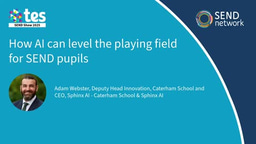PANS and PANDAS: Questions for teachers

What are PANS and PANDAS?
PANS (Paediatric Acute-onset Neuropsychiatric Syndrome)
PANDAS (Paediatric Autoimmune Neuropsychiatric Disorders Associated with Streptococcal Infections)
PANS and PANDAS are post-infectious medical conditions which affect both physical and mental health. They can be triggered by common infections (for example strep throat, chickenpox, influenza or Covid 19). These conditions mainly affect children, and onset usually happens between 3 and 13 years. PANS can also affect adults. Whilst more research is needed, current evidence suggests that early identification and treatment leads to better outcomes and teachers have a crucial role in spotting the early signs.
Why have I never heard of them?
PANS and PANDAS used to be thought of as controversial diseases. This has now all changed and the NHS recognises both PANS and PANDAS. PANDAS is also recognised by the World Health Organisation. There are no NICE guidelines and clinicians in the UK are currently in the early stages of discussing clinical treatment pathways.
Awareness of the conditions is currently low amongst medical, social care and educational professionals although this is now slowly changing. Updated medical Information for CAMHS and GP’s will be shortly rolled out, and an increasing number of schools are reporting that they are supporting children with these diagnosis’. These numbers are only set to increase.
How many children are affected in the UK?
A good question and one that unfortunately can’t be answered very effectively at this stage. The positive news is that clinicians in the UK are at an early stage of gathering the incidence data. Once this has been gathered we will have a better picture of the scale of the issue.
Why are these conditions not included in teacher training?
Historical disagreements about the medical classification and treatment of the conditions alongside a lack of incidence data have all contributed to low levels of awareness. This has been across the board of professionals. Things are now changing in both the medical and education world. Discussions are already underway to include the conditions as part of core teacher training at some universities, there are also a growing number of educational resources available and the PANS PANDAS UK charity is listed on more than 100 Local Offers, but there is a long way to go.
What might I see in the classroom?
Essentially you are looking for a child/young person experiencing multiple unexplained changes in the classroom. Symptoms are broad ranging and can include obsessive compulsive behaviours, tics, eating restrictions and further cognitive, physical, behavioural and emotional signs. Some of the signs you can spot are unusual and may not fit with previous training about the development of learning difficulties. For example, in PANS/PANDAS children/young people can abruptly develop executive functioning difficulties with no emerging signs of issues or handwriting can dramatically deteriorate seemingly out of the blue.
The symptoms of PANS and PANDAS also have overlapping profiles with other conditions that you will be aware of such as ASC or ADHD. It can be very easy to misinterpret the root cause of the symptoms. Children/young people can of course have more than one condition.
.png)
What are my next steps as a teacher?
Talk to the child/young person (as appropriate) and their families and be aware that it is not unusual for children/young people to be presenting differently at home and at school. Ensure that you give due attention to all of the changes (alongside clearly stating how the child/young person was presenting before) and provide supporting evidence for families to take to their GP. Remember that PANS and PANDAS are medical conditions that can only be diagnosed by a medical practitioner.
How can I provide support in the classroom?
Every child with PANS and PANDAS is different so there will be no one size fits all approach. Some helpful steps though include:
- Capture the baseline of the child/young person i.e. how they were functioning in all areas before the first reported symptoms. Ensure that you track that the child/young person is returning to their baseline following a ‘flare’ up of their symptoms
- Follow the guidance for supporting children with medical conditions. Some children with PANS or PANDAS will benefit from having an Individual health care plan.
- Be aware of the unusual characteristics of these conditions, for example the unexpected development of special educational needs. The rapidity of onset can require a very agile response to putting in support.
- PANS and PANDAS can be very confusing and present with a shifting picture of changing symptoms. Support will need to be very flexible to respond to changing needs. Whilst the accommodations required may well align with the support given for other learning needs for example working memory issues, sensory needs, writing difficulties etc, the following variables should also be considered :
- In PANS/PANDAS the needs are caused by a medical condition affecting the brain.
- Needs in these conditions can be very confusing with a continually changing profile. Learning difficulties for example can be transient/fluctuating rather than relatively stable and longer term.
- The conditions can unusually rapidly affect a child in multiple different areas of their functioning, so any assessments will need to be aware of the potential breadth of difficulties.
- The child/young person is additionally coping with the psychological challenges of changes in their ability at school and in their self-identity.
- Understanding around attendance. PANS and PANDAS can affect a child’s/young person’s ability to attend school, and there may be periods where they are too unwell to attend. Ensure that a proactive plan is in place to support connection and support during these periods.
- Awareness that PANS and PANDAS can be very traumatic for children/young people and their families. Support with a child led nurturing approach and remember that siblings may well also require significant pastoral support.
Where can I get further help and support?
PANS PANDAS UK is the only UK charity currently supporting families and children with these conditions.
Further education resources are available here https://www.panspandasuk.org/education
A guide to spotting the early signs at home and at school
https://www.panspandasuk.org/_files/ugd/c803db_8d20d15927f54143b2316b8d634348a0.pdf
https://www.twinkl.co.uk/resource/pans-pandas-information-and-cpd-pack-t-s-1643108429
As part of the CPD- TeachMeet series from Twinkl, there is a free training session ’Supporting Children with PANS and PANDAS in Educational settings’ on Monday 22nd January at 4pm.





Please sign in or register for FREE
If you are a registered user on SEND Network, please sign in